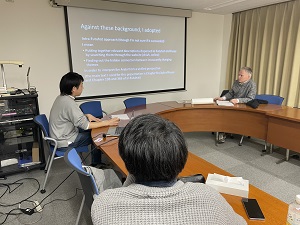Report
On January 23, 2024, the Tobunken Seminar “Graduate Workshop: Al-Shaykh al-Akbar and Ustād-i Bashar: Aspects of Mystical Thoughts in Medieval Islam” was held at the Institute for Advanced Studies on Asia, with Dr. Lloyd Ridgeon from the University of Glasgow serving as the main commentator. Two graduate students from the Graduate School of Humanities and Sociology of UTokyo made presentations therein. Firstly, Mr. Michinari Fujiwara discussed the concepts of “primordial cloud” (ʿamā) and “essence” (jawhar) in Ibn ʿArabī's thought. Secondly, Mr. Naoki Nishiyama presented on the connection between philosophy and mystical thought in the ethical philosophy of Naṣīr al-Dīn Ṭūsī. The seminar was attended by a total of six participants, including commentators and presenters, in person. After each presentation, meaningful comments and Q&A sessions took place.
Event Details:
Date: January 23, 2024 (Tuesday) 16:45–19:05
Venue: Second Conference Room, Institute for Advanced Studies on Asia, University of Tokyo
Presenters: Michinari Fujiwara (Master's Program, Graduate School of Humanities and Sociology, University of Tokyo) and Naoki Nishiyama (Ph.D. Program, Graduate School of Humanities and Socology and Project Researcher, Institute for Advanced Studies on Asia, University of Tokyo)
Commentator: Dr. Lloyd Ridgeon (University of Glasgow)
Presentation 1: Ibn ʿArabī’s Theory of Substance and the Primordial Cloud
Presentation 2: Naṣīr al-Dīn al-Ṭūsī’s Ethics and ʿIrfān
Moderator: Ryo Mizukami (Tokyo University of Foreign Studies)
Abstract 1: It is relatively known that the Primordial Cloud (ʿamāʾ), where God was before creation, is the cosmological substrate in which all existents appear for Ibn ʿArabī. This Cloud is called the only substance (jawhar) in his cosmogony. Previous studies, however, have not paid much attention to the reason why this is the only substance, or tried to explain it following a commentary of the so-called Ibn ʿArabī circle. This presentation aims to clarify how Ibn ʿArabī himself demonstrates that there is no substance other than Cloud, based on both al-Futūḥāt al-Makkīyah and Fuṣūṣ al-ḥikam. These two books have been rarely cross-referred so far because they are regarded to have different characters. However, the study implies that al-Futūḥāt and Fuṣūṣ are consistent to some degree and can be referred to mutually in some cases.
Abstract 2: Naṣīr al-Dīn al-Ṭūsī (d. 1274), renowned for inheriting Ibn Sīnā’s (d. 1037) philosophical legacy, shifted from Ismaili to Twelver Imami amidst the Mongol conquest. During his Ismaili era, he wrote Akhlāq-i Nāṣirī, inspired by Ibn Miskawaih’s (d. 1030) philosophical ethics outlined in Tahdhīb al-akhlāq, while in his later years, he penned Awṣāf al-ashrāf, delving into ʿirfān, or mysticism. Although both discuss the ideal human spirit, their arguments seemingly diverge noticeably. This presentation aims to comprehensively analyze al-Ṭūsī's works, highlighting that, despite his religious conversion, both of his ethical works share the same theoretical framework. Additionally, it underscores that ʿirfān consistently plays a central role in his ethical ideologies across these periods.

